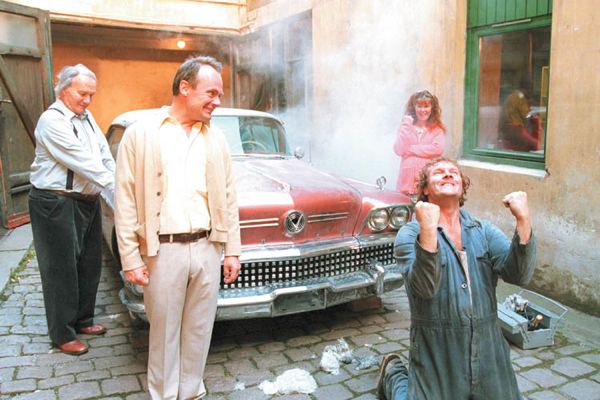Movie review by Greg Carlson
A Norwegian entry for the Best Foreign Language Film at last year’s Academy Awards, Petter Naess’ comic “Elling” is a typical, familiar “Odd Couple” tale of two mentally ill men who must learn to cope in the world in spite of their status as social misfits. Fortunately, “Elling” surpasses the majority of feel-good movies trading in this narrowly-defined subject matter by remaining refreshingly light on the obligatory life lessons so often preached in fare like “Rain Man and “Awakenings.” Naess works hard to overcome the obvious limitations of the static, location-bound script (“Elling” was a successful stage play prior to becoming a film), and finds an unsentimental tone that should please most audiences.
Based on a novel by Ingvar Ambjornsen, both the stage and screen versions of “Elling” focus on the relationship of the title character to his unsophisticated roommate (and eventual best friend). Per Christian Ellefsen plays Elling, a slim, fussy, agoraphobic who was looked after by his mother until her death landed him in a state psychiatric institution. Kjell Bjarne (Sven Nordin) – as practically required in this sort of comedy – is the polar opposite of Elling. Kjell Bjarne (comically, Elling always refers to him by first and last name) is a giant, loutish, bear of a man who rarely bathes and spends most of his time lusting after beautiful young women. Once their term in the hospital is complete, the men are moved into a small apartment in Oslo, assigned a social worker, and expected to essentially take care of themselves.
In the early parts of the film, Naess sticks to the formulaic game plan: Elling and Kjell Bjarne must learn to answer the telephone, buy their own groceries, cook and clean for themselves, and stick to their modest welfare budget (social worker Frank Asli, played by Jorgen Langhelle, is surprisingly understanding when the boys ring up a hefty phone bill for calls to a sex line). Even though the apartment has two bedrooms, the men prefer to share a room just like they did in the institution. Their debate over what to do with the leftover space (library versus workshop) generates a clever motif that is periodically revisited.
Of course, some larger conflicts are needed to propel the action forward, and Elling’s world is shaken up when Kjell Bjarne takes a shine to the pregnant, single, upstairs neighbor Reidun (Marit Pia Jacobsen). Reidun returns Kjell Bjarne’s affections, effectively shutting out Elling, who in many ways has come to depend on his friend as much as he did on his mother. Angry and frustrated, Elling talks himself into attending a poetry reading, where he unknowingly makes the acquaintance of a once-famous writer named Alfons Jorgensen (Per Christensen). Before you know it, all four characters have come together for one of those required road trip-outings that finds them spending a weekend at Alfons’ lake cabin.
While much of the humor in “Elling” is derived from the superficial differences between Elling and Kjell Bjarne, the actors inhabit their roles with considerable charm and impressive depth. Both performers worked together on the stage version, and their rapport translates easily to celluloid. Naess’ collaborator, screenwriter Axel Hellstenius, also worked with the director on both the stage and screen versions of the story, and their intimate familiarity with all the details of the comedy has allowed them to tweak favorite moments (like Kjell Bjarne’s frequent head-butting, or Elling’s sly transformation into the “Sauerkraut Poet” as soon as he puts on a pair of oversized sunglasses) to perfection. Remake rights to “Elling” have already been sold, and an American version is reportedly in the works.
